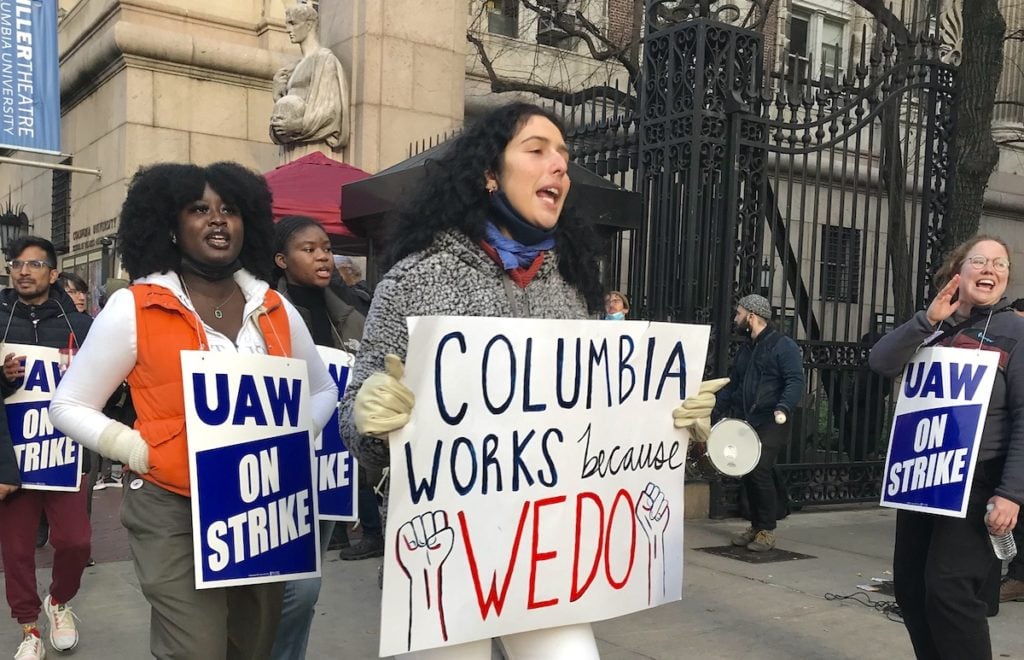After 10 weeks of tireless striking, members of Student Workers of Columbia United Auto Workers Local 2110 voted 2099-51 in favor of ratifying a new contract with Columbia University on Jan. 28.
At a Dec 23 rally, SWC member Kit Hermansen said organizers shared the sentiment that student workers “cannot educate unless we have everything we need to live outside our role as educators.” That rang true for the thousands of student workers on strike who fought for a contract that will improve their livelihoods, as well as their ability to teach.
The new contract includes major concessions from Columbia, such as the creation of a student employee support fund for unforeseen medical expenses, a retroactive 6 percent immediate wage increase, and a stipend increase for those who work at the university over the summer. These are improvements which will likely result in fewer students having to rely on government benefits due to their private employer refusing to provide fair wages, even after Columbia already received billions in government subsidies.
The contract also includes the right for workers to access third party arbitration in sexual assault and discrmination cases, something which was a major goal of their campaign after years of university mishandling of cases. This concession from the university sets an important and sought-after precedent for other colleges to follow, as unions like the Harvard Graduates Student Union UAW Local 5118 have campaigned for this right for years. “This really feels like a contract where no one is getting left behind,” said Grant Miner, a SWC member and a member of the Party for Socialism and Liberation.
The challenge organizers went through to obtain their new contract was immense given the push back they faced from the Columbia administration. During the Spring 2021 semester, SWC began their first strike, which lasted for two months after administrators failed to agree to a fair contract. And then in November 2021, the strike continued when the university refused to agree to the student workers’ demands.
During the rally on Dec. 23, SWC member Caitlin Liss detailed how the union was stonewalled by the university upon trying to negotiate fair wages, and that undergraduate students were being deprived of the education they’re paying handsomely for, many through predatory student loans. The university has “sacrificed half a semester of teaching and learning, half a semester of relative stability all because they refused to use their $14.3 billion endowments” to pay their workers a living wage, said Liss.

The most egregious stunt administrators pulled was a Dec. 2 email in which they threatened to replace the striking workers if they continued the strike past Dec. 9. However, SWC members refused to back down and continued their daily picketing, leading to the cancellation of hundreds of classes during the semester. “We kind of knew it was an empty threat,” since the sheer number of student workers who were members and involved in the strike disallowed the university to follow through,” said Miner.
In fact, by the end of the strike, nearly every researcher, teaching assistant and instructor of record belonging to the union had withheld their labor, according to Miner. This solidarity paired with undergraduate student support is what is believed to have finally forced administrator’s hands after weeks of negative media coverage regarding the university’s unfair labor practices.
Since 2015, Columbia has asked the National Labor Relations Board to disallow teaching and research assistants union membership, essentially denying these positions’ right to be represented by UAW. However, this new contract recognizes both of these positions as being represented by the union, on par with a 2017 ruling by the NLRB, and includes the possibility of casual researchers and student workers at affiliate schools also being recognized at a later date.
Additionally, this contract implements pay parity, bringing Ph.D. students in Public Health and Social Work up to the compensation of those in other fields. This creates a compensation floor, which increases 5 percent after the first year and then 3 percent until the contract ends in 2025.
SWC members will also receive 75 percent of their dental premiums paid for by the university, a contract win, uncommon for most student workers. Another major contract win is the $4,500 dollar per-child child care subsidy that will be accessible to workers in all Ph.D. programs. Both of these concessions will dramatically increase the ability for student workers to have their basic needs met.
This contract victory is yet another example of the power of workers when we come together. Miner said, “I feel like it’s a historic win. I mean, we have one of the strongest contracts [of student workers] anywhere in the United States.” Miner also emphasized that a win for one union is a win for all unions, and hopes that other student worker unions will be able to use SWC’s contract as a baseline for their negotiations.





